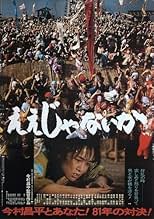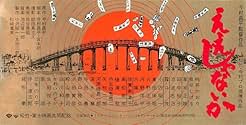Ajouter une intrigue dans votre langueNear the turbulent end of the Edo era, a man returning to Japan after exile in America searches for his wife and becomes swept up in the current of revolution in this incisive period drama f... Tout lireNear the turbulent end of the Edo era, a man returning to Japan after exile in America searches for his wife and becomes swept up in the current of revolution in this incisive period drama from the great Shohei Imamura.Near the turbulent end of the Edo era, a man returning to Japan after exile in America searches for his wife and becomes swept up in the current of revolution in this incisive period drama from the great Shohei Imamura.
- Réalisation
- Scénario
- Casting principal
- Récompenses
- 6 victoires et 7 nominations au total
Avis à la une
TCM's Alicia Malone described this Shohei Imamura film as, among other things, "grotesque" and "messy". To that I would add too long and confusing. At no point could I fully understand what was going on in 1860s Japan as portrayed in this film. Were the peasants betrayed by both their own leaders as well as the Shogunate? Why was the film's hero imprisoned at the start of the film and how did he gain his release? Was it just me or was there a scene where Ine is found drowned only for her to appear later on? I'm sure that if I were to have grown up in Japan these things would have been clearer to me but I didn't and they weren't. Add a plethora of rather dull subsidiary gangster characters and Imamura's annoying habit of taking us away from the interesting central conflict that is the dysfunctional Ine/Genji marriage to dwell on these vacuous, amoral folks, for whom we care not one jot or tittle, and you can understand why I pulled the plug about ninety minutes in and would have done so sooner were it not for the respect I have for the director of "Insect Woman". C plus.
With its shattered scattered narrative, gritty visual and witty music, EIJANAIKA seems to give the truer picture of a time in Japanese history than any typical period picture with standard parameters would have. However, to get this impression of this two-and-a-half hour long film, one needs patience, interest in Imamura's work (It helps if one has seen and liked either Eeel, Vengeance, Narayama, or all of them) and liking for Japanese cinema. The start is very gripping. And its chaotic, musical, darkly funny finale remains one of the more memorable scenes involving mayhem one would encounter in a film from any timezone. It reminded me of the angry-crowd-flying-into-the-air end sequence of Vittorio De Sica's "Miracle In Milan". Overall it's fun to watch Imamura and his crew ("Stop, you funny Showmen! Or I'll Shoot" the ensemble is threatened)lending a musical ear to history.
Japanese Films are great i have seen films from Akira Kurosawa, Yaziro Ozo, Takeshi Kitano, Shunji Iwai, and Takashi Miike these were great directors, which were in my book, which also includes Shohei Imamura's "Eijanaika" is an excellent film this film portrays the Yokohoma in one age The Prostitutes, The Samurais also portrays 2 Lovers nice film overall this was the first film i have seen by Mr. Imamura and i have absolutely enjoyed it not to mention it was greatly shot by the director the beauty of the scenery the fireworks the streets the flowers the people all beautifully shot 10101010 for this good film and to look back at the history it was extraordinary experience, excellent film well as good experience at first glimpse of works of Mr. Imamura.
Shigeru Izumiya returns from shipwreck and a sojourn in America to Japan in the chaos of the Meiji Restoration. He escapes from prison, searches out his wife, Kaori Momoi, who had been sold by her parents to the perpetual carnival outside of Tokyo. They struggle to reconnect, and eventually gain a tentative foothold, only to see it vanish in the last thrashings of the Shogunate.
Shôhei Imamura had taken a decade off from narrative movies to direct documentaries. He had returned to fiction in 1979, but his focus was still on the underclass, and the chaos they live amidst. As his leads struggle and fall, and cease to care, Imamura's focus is on their futile efforts to find some happiness, and the uncaring brutality of their rulers. It's a long journey from Kurosawa's noble samurai and traditional Japanese insistence on dedication to the nation to this frequently shocking movie, but the director's focus and viewpoint are compelling.
Shôhei Imamura had taken a decade off from narrative movies to direct documentaries. He had returned to fiction in 1979, but his focus was still on the underclass, and the chaos they live amidst. As his leads struggle and fall, and cease to care, Imamura's focus is on their futile efforts to find some happiness, and the uncaring brutality of their rulers. It's a long journey from Kurosawa's noble samurai and traditional Japanese insistence on dedication to the nation to this frequently shocking movie, but the director's focus and viewpoint are compelling.
Shohei Imamura's "Eijanaika" is an awesome film -- much better than I expected. This is a film painted on a much bigger canvas than Imamura's norm -- it's rather reminiscent of Dickens's "Barnaby Rudge", albeit with humor, nudity and sex. It is set in the turbulent last days of the Shogunate, and has a large number of characters one must try to keep track of -- something I didn't find that hard to do. Whatever it lacks in "subtlety", it makes up for in exuberance.
Le saviez-vous
- ConnexionsFeatured in Cinéma, de notre temps: Shohei Imamura, le libre penseur (1995)
Meilleurs choix
Connectez-vous pour évaluer et suivre la liste de favoris afin de recevoir des recommandations personnalisées
Détails
Contribuer à cette page
Suggérer une modification ou ajouter du contenu manquant





















